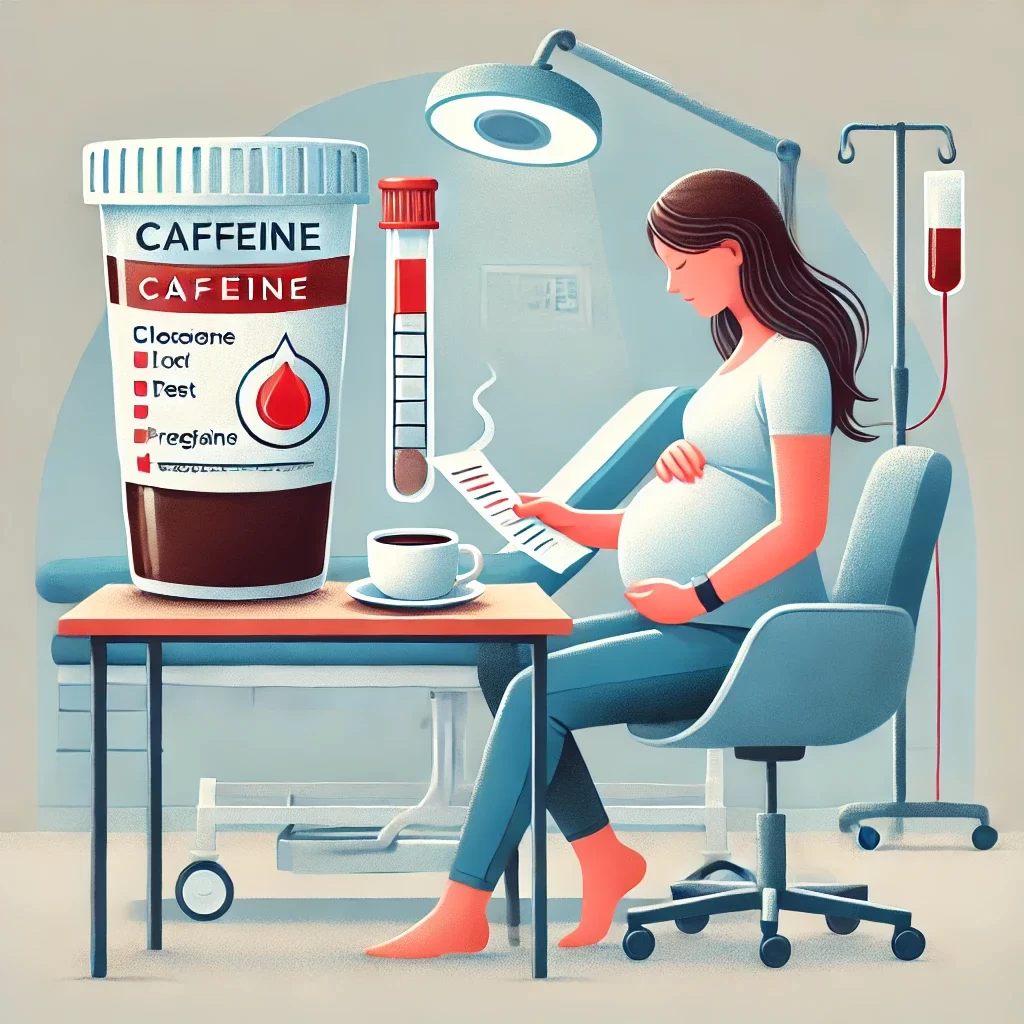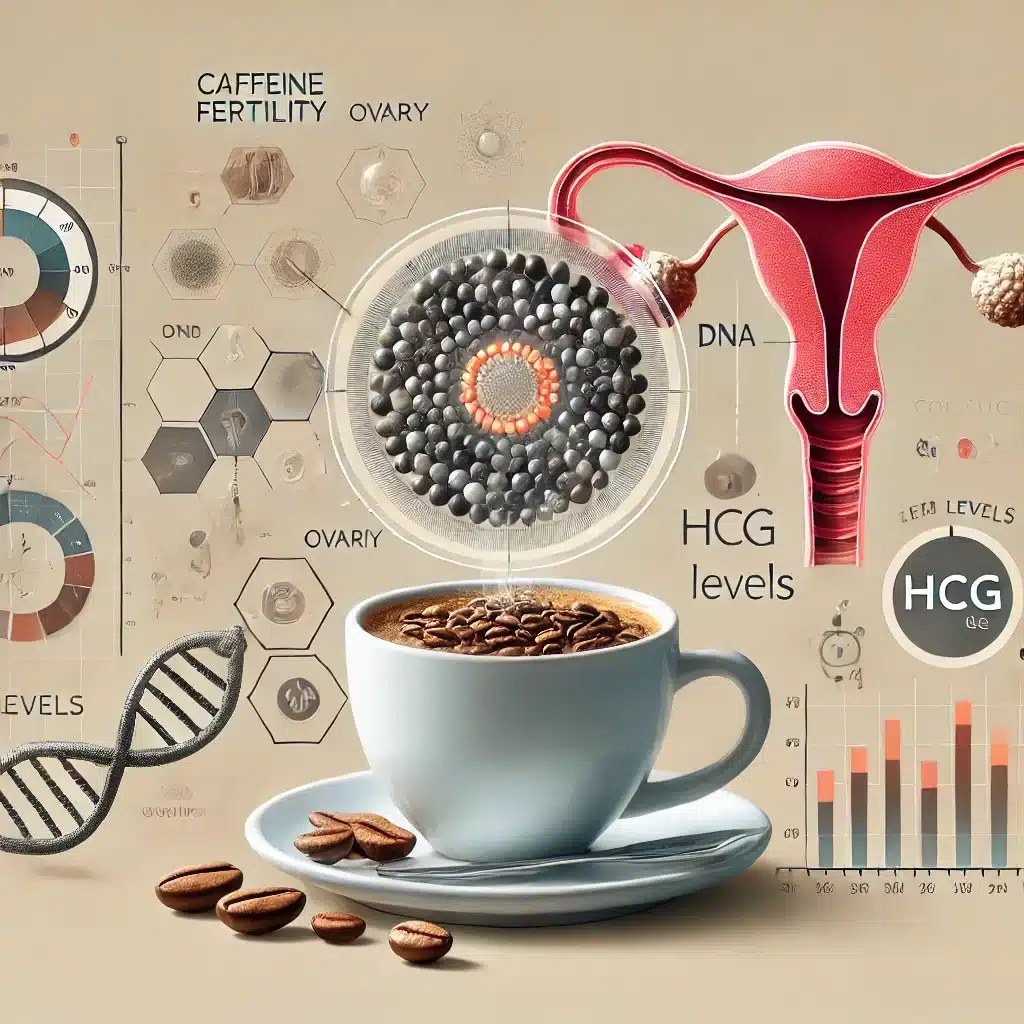OneHundredCoffee is reader-supported, and some products displayed may earn us an affiliate commission. Details
“If you’re trying to conceive (TTC), you’ve probably encountered advice about caffeine and wondered, ‘Do I need to give up my beloved morning coffee in pregnancy or while trying to conceive?’ The good news is, you don’t have to quit entirely—just a little moderation is key.
Let’s talk about how coffee fits into the journey of trying to get pregnant.”

How Does Caffeine Affect Fertility?
Caffeine is the magic ingredient in coffee that gives you that much-needed morning pick-me-up. But a few cups too many might not be so magical when it comes to fertility.
Here’s what science tells us:
- Moderate caffeine is generally okay. Research shows that having up to 200 milligrams of caffeine daily—roughly one 12-ounce cup of coffee—doesn’t seem to hurt your chances of conceiving. Phew!
- Too much caffeine might slow things down. If you’re drinking 3-4 cups (or more) daily, that’s over 400 mg of caffeine. Studies suggest this could slightly reduce fertility or delay how long it takes to get pregnant.
- It might mess with hormones. Caffeine can affect your stress hormone (cortisol) and even some reproductive hormones, potentially disrupting ovulation for some women.
What About Pregnancy Risks?
Let’s think ahead! If you’re TTC, you’re likely also thinking about how caffeine could affect pregnancy:
- Experts recommend keeping caffeine intake below 200 mg/day during pregnancy. High amounts have been linked to an increased risk of miscarriage or lower birth weights.
- If cutting down now feels manageable, it might make it easier to stick to these limits once you get that positive test!
Does Coffee Ruin Your TTC Journey?
Not at all! The key is balance. Here’s why:
- Lifestyle factors matter more. Things like maintaining a healthy weight, eating a balanced diet, and reducing stress have a much bigger impact on fertility than whether you have one or two cups of coffee.
- Individual bodies are different. Some women metabolize caffeine quickly, and for them, one cup might not be a big deal. Others feel jittery after just a sip. Pay attention to how your body reacts!
A Game Plan for Coffee Lovers TTC
Want to keep enjoying your favorite brew without overdoing it? Here are some tips:

- Stick to the Sweet Spot.
- Aim for less than 200 mg of caffeine daily. That’s about:
- 1-2 cups of brewed coffee (8-12 ounces each).
- Or 2-3 cups of black tea.
- Don’t forget hidden sources of caffeine, like energy drinks, soda, chocolate (yes, chocolate!), or some medications.
- Aim for less than 200 mg of caffeine daily. That’s about:
- Try Half-Caff or Decaf.
- Focus on Fertility-Friendly Foods.
- Coffee is okay, but don’t let it take the place of water or nutrient-rich foods. Hydration and nutrients like folic acid, vitamin D, and omega-3s are super important when you’re TTC.
- Add foods like leafy greens, avocados, nuts, and fish to your diet—they’re all fertility superstars.
- Balance Coffee with Water.
- Caffeine can be a little dehydrating, so balance every cup of coffee with a glass of water to keep yourself hydrated.
- Be Kind to Your Body.
- Stress can affect fertility more than coffee ever could. So if your morning coffee is a ritual that helps you relax, don’t feel guilty about keeping it in your routine.
The Bottom Line
You don’t have to quit coffee cold turkey while trying to conceive. Just keep it moderate (one or two cups a day), and focus on your overall health and well-being. Your journey to conception is about balance, not perfection.
Coffee and Pregnancy Tests:
Pregnancy tests are an essential tool for detecting early pregnancy, and many women wonder if lifestyle factors, such as coffee consumption or caffeine intake, can interfere with the accuracy of these tests. This section explores the relationship between coffee, caffeine, and pregnancy tests in detail.
Does Coffee or Caffeine Affect the Accuracy of Pregnancy Tests?
No, coffee or caffeine does not affect the accuracy of pregnancy tests. Pregnancy tests work by detecting human chorionic gonadotropin (HCG), a hormone produced after a fertilized egg attaches to the uterus. The presence of caffeine in the body does not interfere with the production, release, or detection of HCG.
How Pregnancy Tests Work
- Urine Pregnancy Tests: Detect hCG in the urine, typically 6–12 days after ovulation.
- Blood Pregnancy Tests: Measure hCG levels in the bloodstream and are more sensitive than urine tests.
Key Points
- Drinking coffee or caffeinated beverages does not influence hCG levels or the ability of a test to detect them.
- The accuracy of a pregnancy test depends on factors such as the timing of the test, the sensitivity of the test, and whether it was used correctly.
Can Coffee Consumption Before a Test Cause False Results?
Caffeine itself does not directly cause false-positive or false-negative results. However, related factors might indirectly influence the test’s outcome:

A. False-Positive Results
A false-positive result occurs when the test shows pregnancy when there is none. Coffee does not contribute to this, but other factors might:
- Chemical Interference: Medications like fertility drugs that have hCG.
- Medical Conditions: Rare conditions like trophoblastic disease or certain cancers.
- Test Errors: Improper use or expired tests.
B. False-Negative Results
A false-negative result occurs when the test does not detect pregnancy despite being pregnant. Coffee consumption does not cause this directly, but the following factors could:
- Diluted Urine: Drinking excessive fluids (including coffee) before the test can dilute urine, reducing hCG concentration and making it harder to detect.
- Tip: Test with the first-morning urine, as it is the most concentrated.
- Testing Too Early: If hCG levels are too low to detect, even the best test may yield a false-negative result.
Does Caffeine Consumption Impact Fertility or HCG Levels?

While caffeine does not affect hCG levels directly, it can have a subtle impact on fertility and pregnancy-related factors:
Impact on Fertility
- High Caffeine Intake: Some studies suggest that consuming more than 300–500 mg of caffeine per day may slightly reduce fertility in women, potentially delaying conception.
- Moderate Intake: Consuming moderate amounts of caffeine (200 mg or less per day) is generally considered safe and unlikely to impact fertility significantly.
Impact on hCG Levels
- No Effect: Caffeine does not influence the production or release of HCG in the body.
Tips for Accurate Pregnancy Test Results
To ensure correct results, consider the following:
A. Best Practices for Urine Pregnancy Tests
- Test Timing:
- Test at least one week after a missed period to ensure sufficient hCG levels.
- Use first-morning urine, which is more concentrated and has higher hCG levels.
- Avoid Excess Fluids Before Testing:
- Limit coffee, water, and other fluids before taking the test to avoid diluting your urine.
- Follow Instructions:
- Read and follow the pregnancy test instructions carefully for reliable results.
B. Factors That Can Affect Results
- Medications: Fertility treatments or other drugs that have hCG may lead to false positives.
- Improper Storage: Storing pregnancy tests in high heat, humidity, or past their expiration date can affect accuracy.
The 6 Most Accurate Pregnancy Tests You Can Trust
| Image | Product | Features | Price |
|---|---|---|---|
Best Overall  | Best Overall The test is highly sensitive, detecting pregnancy up to 6 days before a missed period, making it ideal for early detection | Price on Amazon | |
Best Accuracy  | Best Accuracy This Test offers a user-friendly digital display with a reassuring countdown and clear "Pregnant" or "Not Pregnant" results | Price on Amazon | |
Best Response  | Best Response Clearblue Rapid Detection Pregnancy Test provides results in just one minute with a color-changing tip for confirmation | Price on Amazon | |
Best Options  | Best Options This test includes three different test types (early, rapid, and digital) for maximum reassurance and versatility | Price on Amazon | |
Best Trusted  | Best Trusted Easy@Home Pregnancy Test Strips are reliable and affordable, providing clear line results ideal for frequent early detection | Price on Amazon | |
Best Affordable  | Best Affordable Wondfo Pregnancy Test Strips are highly sensitive, simple, and cost-effective, making them a trusted option for frequent testers tracking ovulation and conception. | Price on Amazon |
When selecting a pregnancy test, it’s essential to consider factors such as sensitivity, ease of use, and result clarity. Here are SIX highly regarded pregnancy tests known for their accuracy
First Response Early Result Pregnancy Test
- Key Feature: Detects pregnancy as early as 6 days before your missed period, thanks to its ultra-sensitive hCG detection technology.
- Accuracy: Over 99% accurate on the day of the expected period and provides early detection for peace of mind.
- Advantages: Highly sensitive, easy-to-hold handle, and clear, dark test lines for quick interpretation.
- Ideal For: Individuals seeking early detection before their missed period.
Clearblue Digital Pregnancy Test with Smart Countdown
- Key Feature: Digital display eliminates guesswork with clear “Pregnant” or “Not Pregnant” results. Includes a countdown timer while processing.
- Accuracy: Over 99% accurate from the day of the expected period.
- Advantages: Reassuring countdown feature, large digital screen, and easy to use.
- Ideal For: Those who prefer straightforward results and a modern digital format.
Clearblue Rapid Detection Pregnancy Test
- Key Feature: Provides results in just one minute, with a color-changing tip for confirmation that the test is working.
- Accuracy: Over 99% accurate from the day of the expected period.
- Advantages: Fast results, a wide tip for easier urine sampling, and clear result windows.
- Ideal For: People looking for quick and reliable results with an easy-to-hold design.
First Response Triple Check Pregnancy Test
- Key Feature: Includes three different types of tests (early result, digital, and rapid response) to confirm and ensure accuracy.
- Accuracy: Over 99% accurate when used as directed.
- Advantages: Provides varied testing options to suit different preferences and scenarios.
- Ideal For: Those seeking maximum reassurance and the ability to double or triple-check their results.
Easy@Home Pregnancy Test Strips
- Key Feature: Known for their sensitivity and reliability, ideal for detecting pregnancy early and frequently.
- Accuracy: Over 99% accurate from the day of the expected period.
- Advantages: Easy to read with clear line results, cost-effective for bulk purchases.
- Ideal For: Those who want reliable and affordable tests for early detection.
Wondfo Pregnancy Test Strips
- Key Feature: Popular for affordability and high sensitivity, often favored by those actively tracking ovulation and conception.
- Accuracy: Over 99% accurate when used after the expected period and reliable for early detection.
- Advantages: Compact, cost-effective, and provides clear results with minimal hassle.
- Ideal For: Frequent testers looking for a simple and inexpensive solution.
When choosing a pregnancy test, consider your preferences regarding result display (digital vs. line), sensitivity, and ease of use. Always follow the manufacturer’s instructions for accurate results.
Can Caffeine Affect Pregnancy Blood Tests?
Caffeine has no direct impact on pregnancy blood tests, which measure hCG levels with greater sensitivity than urine tests. Blood tests are unaffected by food, drinks, or caffeine intake.
Caffeine and Early Pregnancy Symptoms
For women who are already pregnant and suspect they might be:
- Caffeine Sensitivity: Early pregnancy can heighten sensitivity to caffeine, leading to symptoms like jitteriness, nausea, or increased heart rate.
- Morning Sickness: Coffee may worsen nausea, a common symptom in early pregnancy.
Myths About Coffee, Caffeine, and Pregnancy Tests
- Myth: Drinking coffee before a pregnancy test can cause a false negative.
- Fact: Coffee does not affect the test itself, but can dilute urine if consumed in copious quantities.
- Myth: Caffeine interferes with hCG production.
- Fact: Caffeine does not affect hCG levels or pregnancy hormone production.
Frequently Asked Questions
Q: Can I drink coffee before taking a pregnancy test?
Yes, but avoid excessive amounts that may dilute your urine. Use first-morning urine for the most correct result.
Q: Should I avoid coffee while waiting for test results?
No, there’s no need to avoid coffee while waiting for results. Caffeine doesn’t affect test accuracy.
Q: Is it better to avoid caffeine when trying to conceive?
Moderate caffeine consumption (up to 200 mg per day) is unlikely to affect conception. However, high caffeine intake may slightly reduce fertility, so cutting back might be beneficial if you’re trying to conceive.
Conclusion
Coffee or caffeine consumption does not directly affect pregnancy test accuracy or hCG levels, but excessive fluid intake, including coffee, can dilute urine and lead to less reliable results. To ensure a correct pregnancy test:
- Use the test first thing in the morning.
- Avoid drinking copious amounts of coffee or other fluids before testing.
- Follow the test instructions carefully.
If you’re trying to conceive or have questions about caffeine and pregnancy, consult your healthcare provider for personalized advice.






